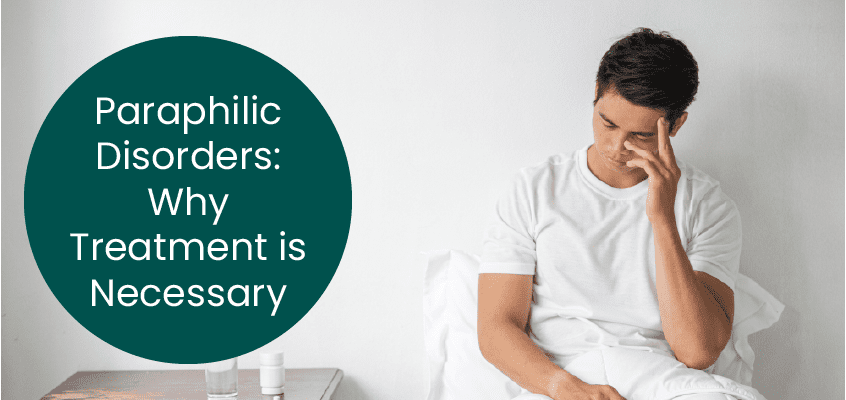Introduction
Sexual fantasies in adults are quite common. However, having unnatural sexual feelings toward lifeless objects, animals or people is classified as a paraphilia.
Adding variety to a person’s sexual life can help them have a healthy sexual relationship. However, seeking a partner’s consent for such activities is essential. When a person has paraphilic thoughts, the desire to humiliate or harm themselves or their partner sexually may be more.
What are paraphilic disorders?
Paraphilia is an emotional disorder where a person has unnatural intense sexual feelings. It involves unusual sexual feelings for inanimate objects, behaviours, situations, or fantasies. Extreme interest in people or children who aren’t consenting is a common feature of paraphilic thoughts. Paraphilia also includes having thoughts about one’s suffering and humiliation and the suffering of one’s partner. Individuals with the paraphilic disorder might be unable to engage in healthy sexual activity.
There are many types of paraphilia:
-
Exhibitionism involves exposing one’s genitalia in front of an unsuspecting person.
-
Voyeurism involves secretly watching other people undress or engage in sexual activity.
-
Frotteurism: It involves touching or rubbing oneself against a non-consenting person.
-
Sexual masochism involves becoming sexually aroused by being beaten, tied, or humiliated.
-
Sexual sadism involves becoming sexually aroused by seeing someone suffer emotionally or physically.
-
Paedophilia: It involves having a sexual interest in pre-pubescent children.
-
Transvestism: It involves becoming sexually aroused by cross-dressing.
Apart from masochism, paraphilic disorders in a sentence are most commonly diagnosed in men. Many individuals may suffer from one or more types of paraphilia. Male fragility and sensitivity to harsh prenatal environments may be greater than that of females, which may help to explain why men are more likely to display paraphilias.
Symptoms of paraphilic disorders
Commonly, doctors diagnose paraphilic disorders when a person has unnatural sexual urges for more than six months.
The symptoms in people showing signs of paraphilias depend on the object of their sexual interest. Some common symptoms include:
-
Being sexually aroused by something unnatural
-
Not interested in regular sexual activity with a partner
-
Uncontrollable sexual fantasies to the point where it becomes difficult to lead an everyday life
-
Using sex as a mechanism to deal with anxiety, stress, depression, or loneliness
-
Becoming sexually aroused by seeing someone suffer physically and emotionally
People with paraphilic disorders may suffer from high-functioning anxiety and depression. But these symptoms go away once they give in to their sexual urges, which bonds them into an addictive cycle that is difficult to break.
Causes of paraphilic disorders
There are many theories when it comes to the causes of paraphilic disorders. Some scientists suggest that paraphilias are related to how our brain functions during sexual activity. Others believe it may be the result of an unnatural sexual experience in childhood and also due to suppressed sexual desires. Sometimes, paraphilic disorders can be another form of obsessive-compulsive disorder.
Other causes of paraphilic disorders may include:
-
There may be an imbalance in dopamine, serotonin, and norepinephrine neurotransmitters. These chemicals regulate moods and sexual urges, and an excess of neurotransmitters can increase sexual desires to an unnatural level.
-
Medical conditions such as epilepsy, multiple sclerosis, or dementia can lead to one becoming obsessed with a particular person.
-
There may be changes in the way the brain synthesizes pleasurable experiences. When the pleasure pathways in the brain change, new courses are found. It leads the brain to constantly seek delightful experiences, which may lead to paraphilic behaviours.
-
There may be fluctuations in the body’s androgens or sex hormones, which play an essential role in shaping sexual libido and desires.
Effects of paraphilic disorders
People with paraphilias are often diagnosed with other personality disorders, such as obsessive-compulsive disorder or narcissism. Other effects of paraphilic diseases may include:
-
Volatile temperament and anger issues; tendency to be short-tempered and act impulsively on urges
-
Lack of self-awareness
-
Trouble managing and sharing emotions
-
Inability to maintain a steady relationship with sexual partners or family members
-
Intense desire to victimize others and watch them suffer
-
Inability to derive pleasure from normal sexual activities
-
Contracting sexually transmitted diseases due to the number of sexual partners
-
Getting into legal trouble by indulging in sexual acts involving non-consenting individuals.
Treatment of paraphilic disorders
There are various treatment options available for people dealing with paraphilias. The most effective form of treatment includes a combination of medications and psychotherapy. In addition, some studies show the most effective treatment in people with paraphilia disorders. It is when they are motivated and committed to making a positive change.
Some common treatments for paraphilic disorders include:
-
Psychotherapy
Psychotherapy and counselling sessions are essential to the treatment plan for paraphilias. Some of them are Cognitive behaviour therapy, anger management, and counselling for depression. These may help understand behaviour patterns and reinforce positive behaviours. Doctors may also recommend social skills training to help people form and maintain meaningful social relationships.
Moreover, therapy helps sex offenders empathize with their victims and control their sexual impulses. Therapists encourage the patients to find ways to direct their urges into something more productive.
-
Medications
In addition, medications help suppress the production of male sex hormones, thereby allowing control of sexual urges. Selective serotonin reuptake inhibitors (SSRIs) are effective in treating paraphilias. Some commonly used SSRIs are fluoxetine, paroxetine, and citalopram. Anti-depressants and mood stabilizers like lithium and naltrexone also alleviate the symptoms of paraphilias.
Conclusion
However, paraphilias are persistent and recurrent sexual interests in inanimate objects, activities, or situations. People with paraphilias often face social isolation and prejudice due to their unconventional sexual choices. Most of them are viewed as sexual predators—however, not all people who exhibit paraphilias brighter offenders.
Peowith paraphilias can lead everyday lives. At United We Care, our mental wellness experts will guide you toward a better, brighter future free from unnatural thinking patterns and behaviours. Click here to talk to an expert today!










